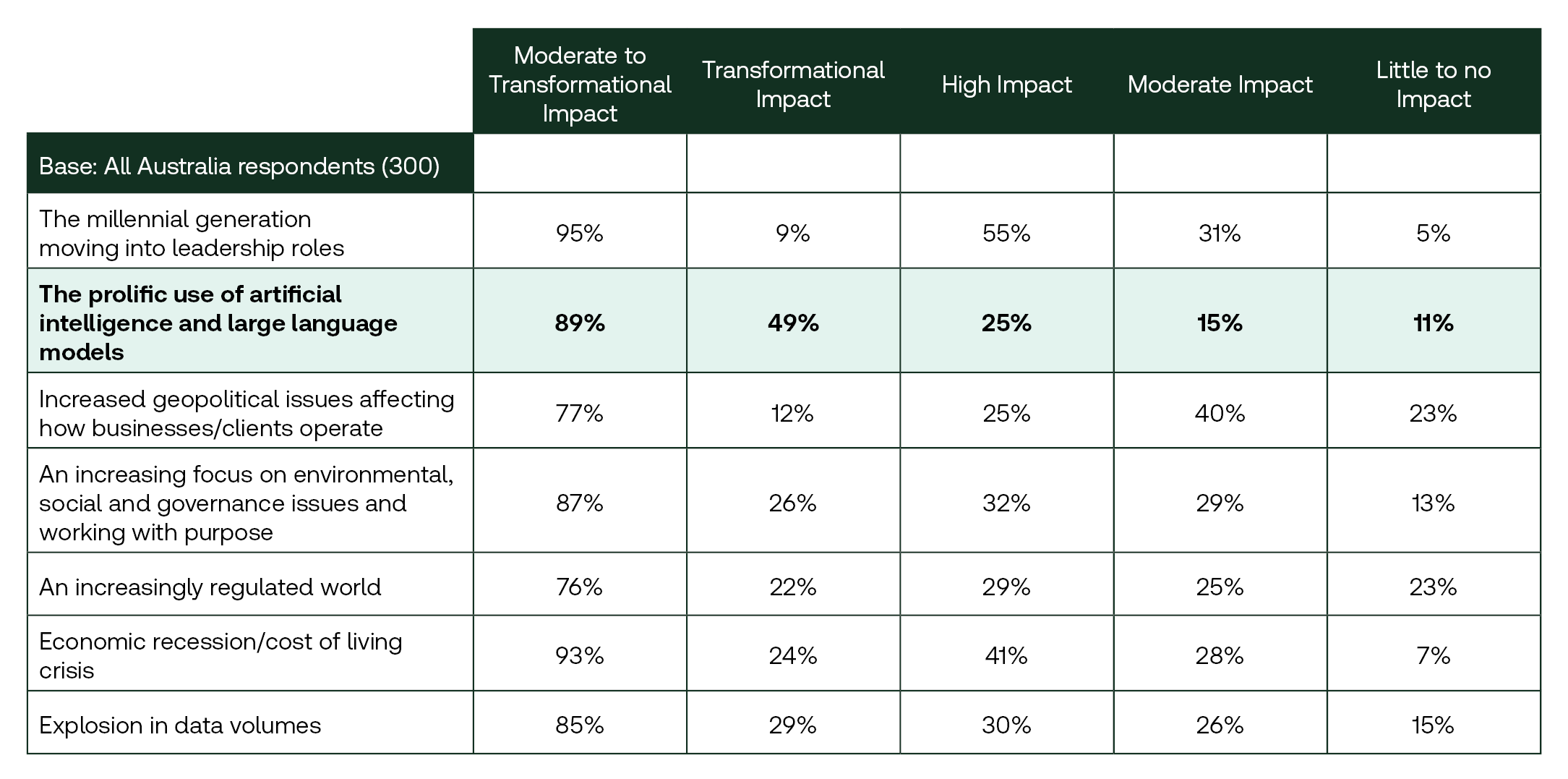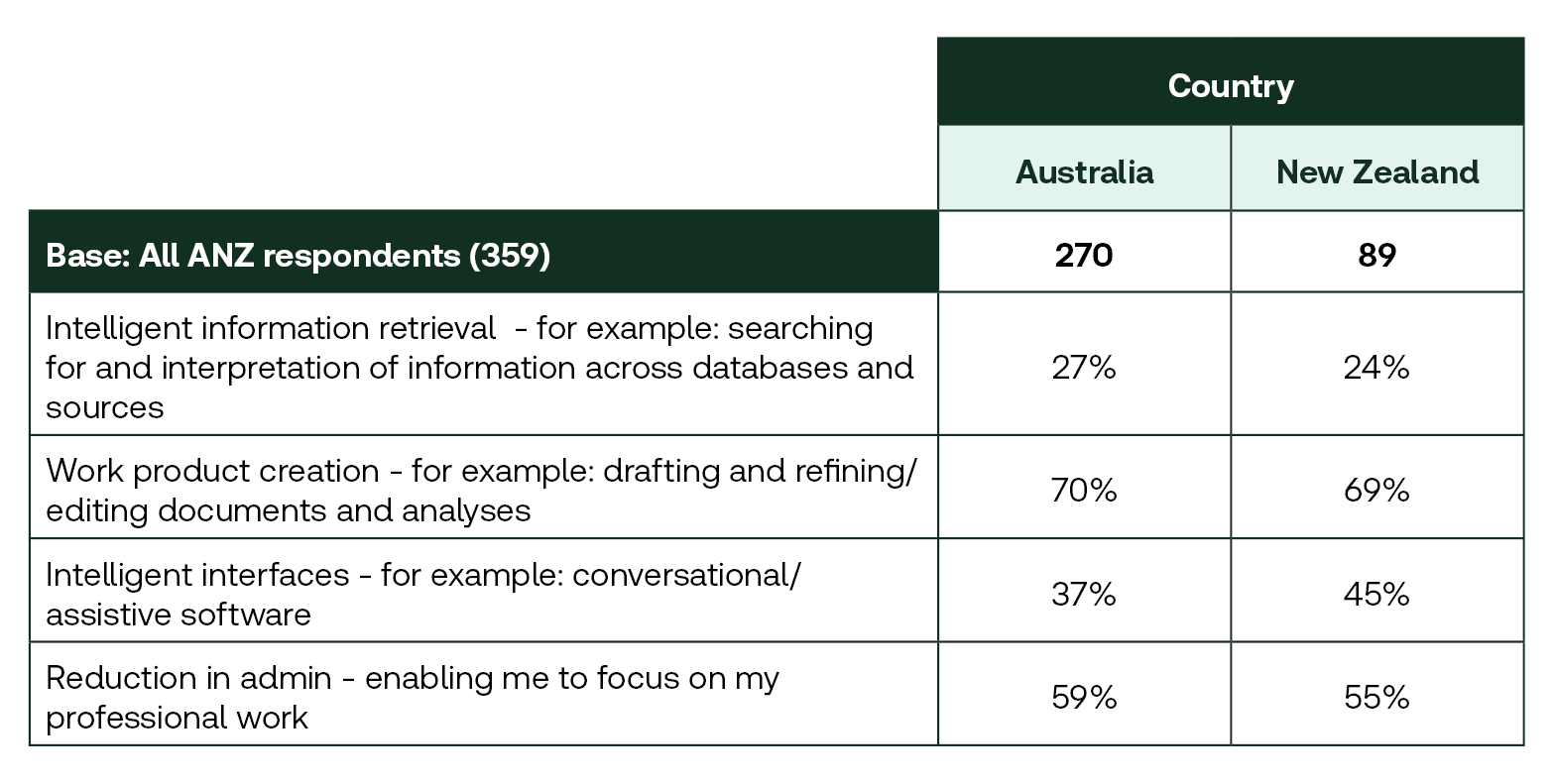Gen AI will drive the future of legal practice by enabling a laser focus on high-value work, predicts Thomson Reuters.
The vast majority of Australian professionals expect artificial intelligence and generative AI to significantly impact their work in the next five years. Thomson Reuters research found that 89% expect the rise of AI to significantly affect their profession, among which 74% believe it will have a high to transformational impact.
Corporate counsel are strong proponents of adopting Gen AI to maximise efficiency. More than three fifths (62%) of in-house lawyers believe Gen AI should be applied to industry work, primarily as a means to achieve cost savings. A similar amount (58%) said vendor firms should use Gen AI in their work to increase productivity.
Levels of interest in this revolutionary technology are on the rise as confidence grows in its wide-ranging abilities. “Corporate counsel are increasingly recognising the enhanced value that Gen AI can bring to their legal team has a flow-on positive effect to their business,” commented Tyrilly Csillag, Director of Legal Transformation at Thomson Reuters.
Gen AI legal assistants have the potential to significantly increase the capacity of legal departments to take on new work. According to current estimates, they can save each in-house counsel up to four hours a week in the next year, and up to 12 hours a week within the next five years.
This translates to an annual saving of approximately 200 hours per person. For a legal team of 10 individuals, this is equivalent to adding a new person to the department.
Levels of Gen AI adoption are clearly on the rise. Two fifths (41%) of in-house counsel said their organisations are considering using Gen AI, up from 30% in 2023. In addition, 14% of corporate legal departments and law firms have already started using the technology on an enterprise-wide basis.
Whilst lawyers are comfortable leveraging open-source Gen AI tools such as ChatGPT (27%), the demand for legal-specific Gen AI tools is projected to soon outstrip that for open-source tools. More than two fifths of lawyers (43%) plan to use legal Gen AI solutions within the next three years, compared to a fifth (20%) who intend to use open-source tools.
For legal professionals, the obvious choice is to rely on trusted legal technology that incorporates Gen AI. The best Gen AI legal solutions contain lawyer-tested guardrails to ensure the accuracy and reliability of all outputs. They also incorporate industry-leading data security protocols that ensure only authorised parties have access to confidential information and trade secrets. CoCounsel, for example, ensures user inputs and client information are never used to train the underlying AI or product, and utilises Thomson Reuters' strict AI governance frameworks to ensure AI processes align with ethical standards and mitigate algorithmic bias risks.
More than half (55%) of the legal industry will be using legal technology that incorporates customised Gen AI tools by 2027, based on current plans. This is set to rise even further by 2029.
“Within the next five years, every in-house counsel will be working with a Gen AI legal assistant,” predicted Csillag. “These virtual legal assistants have a professional understanding of legal concepts and can be instructed in the same way as you'd instruct a paralegal using plain English instructions without the need to understand complex prompting. The best part is that they are available 24/7 to perform complex tasks, at the same time, and at lightning speed. They fully detail their work product with referable links to ensure the human lawyer is very much in the loop and can review and sign off on the work product quickly and with confidence.”
Figure 1: Trends Affecting Australian Professions in the Next Five Years

Source: Future of Professionals Report - AEM Edition, 2024
How Gen AI will transform legal department operations
One clear benefit of Gen AI for legal departments is reduced expenditure on outside counsel. Corporate counsel will be able to rapidly complete substantially more routine work in-house, within their own timeframes and requirements. Almost 70% of professionals globally said they expect the same or a higher amount of work will be brought in-house within the next five years.
Australian professionals said they most want Gen AI to help them with work product creation. In fact, 70% want it to support them in drafting and refining/editing documents and analyses. In addition, 59% would like AI to reduce their administrative burdens so that they can focus more on professional work.
Figure 2: What Do ANZ Professionals Want AI to Help Them with Day-to-Day?

Source: Future of Professionals Report - AEM Edition, 2024
In-house counsel told us that their top use case for Gen AI is legal research. Legal know-how platforms that incorporate Gen AI can provide reliable responses to complex legal questions at superhuman speeds. For example, Westlaw Precision Australia can provide fully referenced responses that draw on a trusted database of case law, authorised law reports and primary law content.
Another top use case for Gen AI that corporate counsel highlighted is document management. This includes contract drafting, document review and document summarisation. Gen AI solutions for lawyers such as CoCounsel can quickly and accurately read, analyse and summarise complex legal documents at a postgraduate level. It can also redline draft contracts to ensure they comply with internal policies and regulatory guidance, with comments, and create a draft email summarising the mark-up to speed up the lawyer's workflow process.
Corporate counsel to drive new business value with Gen AI tools
The growing recognition of the value that Gen AI can bring may soon lead to advanced-level digital transformations that enable legal departments to operate more efficiently and effectively.
Thomson Reuters research found that 93% of global professionals are excited about the potential value that AI-powered technologies could bring to their workplaces.
Nearly three quarters (72%) of legal professionals worldwide believe that AI will be a force for good in their profession.
Two fifths (39%) of professionals across the legal, compliance, financial and trade sectors foresee that Gen AI will bring new value. This includes handling large data volumes more efficiently, reducing inaccuracies caused by human error, and supporting decision making through advanced analytics. In addition, 28% expect AI to increase efficiency and productivity, and 26% anticipate AI will free up their time. This could lead to greater work/life balance (59%) and more time being spent on engaging, judgement-based or expertise-driven work (42%).
Ultimately, Gen AI could support legal departments in developing innovative solutions to business problems. “Gen AI has the potential to help in-house counsel to truly take on the role of being business growth enablers” commented Csillag. “By freeing up valuable time and headspace, it can help lawyers to innovate, to think creatively and to deliver strategic business advice that draws on AI-generated insights.”
Nearly four fifths (79%) of professionals across all industries worldwide expect to see a significant to moderate improvement in innovation by 2029. This will likely be driven by Gen AI freeing up time previously spent on routine, repetitive and mundane tasks. Two thirds (66%) expect to see more time being allocated to value-based work, and 57% foresee greater opportunities for strengthening skills.
It’s clear that this advanced technology has the potential to transform legal work. “In-house counsel enabled with Gen AI legal assistants are set to thrive,” concluded Csillag. “Their capacity and capabilities are augmented and they are engaged in meaningful, rewarding and value-driven work that benefits their business in the short, medium and longer term.”
Corporate legal departments told us that their top priorities in 2024 are increasing team effectiveness, cost efficiencies, business enablement, and risk management. Gen AI legal assistants can help in-house counsel to meet each of these priorities - either directly by boosting performance, or indirectly by freeing up lawyers’ time and capacity.
Some corporate counsel may remain cautious about Gen AI and prefer to wait and see how their peers leverage it before doing so too. While this sentiment is understandable, failing to act now may pose the business risk of a competitive disadvantage. The rapid development of AI technology does not grant permission for a lawyer’s typical deliberate, measured approach to adopting new technology. Thomson Reuters' research reveals most C-Suite executives say that if they are not already using AI for a wide variety of functions, they will be within the next 18 months. What this means is that even those General Counsel who do not feel that AI has reached a level at which it’s ready to be used in their legal department — or perhaps that their department isn’t yet ready for AI — are likely within a broader enterprise already moving toward AI rapidly. It really is incumbent upon the law department to enable that growth by outlining a safe path for AI adoption within the enterprise.
Move beyond desk research and try the technology for yourself. Ask industry-leading legal tech providers to provide free demos of their Gen AI solutions. See for yourself how they can increase the accuracy, speed and reliability of your team’s legal research, contract drafting and document management.
Ready to explore what Gen AI solutions can do for you? Book a demo today.